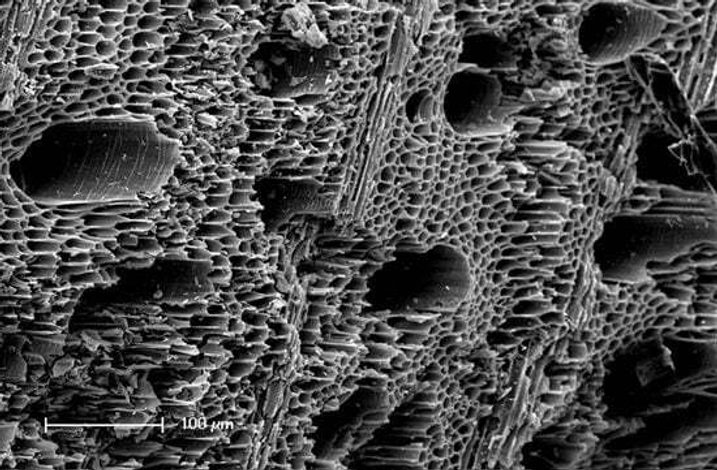In a nutshell...
Funding: from £250,000* (scalable project)
Length: 2 years
Location: Dorset National Landscape
Aim: To unlock enhanced carbon capture and biodiversity benefits in woodland planting projects using biochar.
Opportunities: Corporate visit days.
*subject to additional management fees.

The opportunity
This R&D* project aims to unlock enhanced carbon capture and biodiversity in woodland projects by using Ramial Chipped Wood and biochar. It would feed into an innovative new woodland strategy for Dorset National Landscape, with the potential to roll out across the wider protected area network.
Soil health is a serious concern here in the UK. In fact, its degradation costs us around £1b/year. Enter: RCW and biochar.
Ramial chipped wood (RCW) and biochar are comprised of organic matter rich in nitrogen and beneficial nutrients for soil and plants. They lock in moisture, neutralise pH, aerate soil, boost microbes, and sequester more carbon. These materials provide trees and the ecosystem around them with a nutrient boost, making them resilient for the future.
This project could feed into the Woodland Carbon Code which is endorsed by the UK government and running successfully throughout the country. We could achieve so much more with this market by looking holistically at what planting trees can achieve for people and for nature.
*Research & development.

The idea of using biochar in soils was born from observing the man-made ‘Terra Preta’ soils of the Amazon.
The fertility of the poor, acid soils in this region is thought to have been improved through addition of charred organic material by the area’s indigenous inhabitants: helping to sustain population expansion across the Amazon region.
Biochar retains much of the open capillary structure from the original wood, including Xylem vessels. In soil these channels continue to function as conduits for air, water.
Royal Horticultural Society | Biochar
Woodland planting is a popular and important way of conserving and enhancing our natural environment.
From carbon sequestration to flood reduction, climate resilience, and health and wellbeing benefits, we are very good at seeing the wood from the trees.
But there's more we could achieve if we looked beneath our feet too. Much more goes on under ground than we realise, and with a host of new research into the benefits of using biochar to boost biodiversity and soil health, it's time to test the water. And that's what this project is all about.

This review examines 168 peer-reviewed studies published between 2005 and 2025 to assess the effects of biochar on soil physicochemical properties, microbial processes, nutrient dynamics, and environmental remediation.
Biochar improves soil structure, pH buffering capacity, cation exchange capacity, microbial resilience, yield improvement and greenhouse gas mitigation.
The review also evaluates barriers to field-scale adoption, including production cost, lack of technical knowledge, and limited policy support.
Biochar for sustainable soil management: a 2025 review
The project
This project would examine how we can apply the new research findings in a practical way, starting in Dorset National Landscape.
It would seek to answer questions such as:
- Is it feasible for a landowner to turn their own waste products into biochar? If so, what is that process and what equipment is required? Themes of regenerative agriculture and circular waste management.
- If not, what role could the National Landscape play in finding suppliers and facilitating a long-term, sustainable model? Scalable blueprint for all the National Landscapes and possibly other protected areas in the UK.
What your business will help to fund:
- A truly scalable, pioneering project that will feed into the future of nature-based solutions projects with an (eco)systems thinking approach.
- Unlocking the practicalities of an exciting regenerative agriculture method to be shared across the country.
- Translating research into action, and the findings could feed back into new areas of R&D for further enhancement and scale.
Key outputs
- Develop the innovative new woodland strategy for Dorset and revive its woodland partnership.
- Conduct a literature review on the use of biochar and RMC to support a landscape scale woodland strategy.
- Develop an operations manual for the delivery of a series of pilot activities as identified from the literature review.
- Gather the academic literature available on biochar and RMC and develop the practical activities required to test/trial findings on a local level.
- Pilot these activities with identified landowners.
- Look at blended finance mechanisms to enhance and expand outcomes (e.g. Farming in Protected Landscapes).
- Understand the carbon lifecycle around biochar and how this impacts carbon emissions and sequestration. This could help make biochar more mainstream and bolster soil and woodland conservation work nationally.
- Implement current methodologies for measuring the impact on soil health – understanding impact will be a longer-term activity.
Keen to hear more?
Reach out to the team to discuss this project and how we can work together below.
